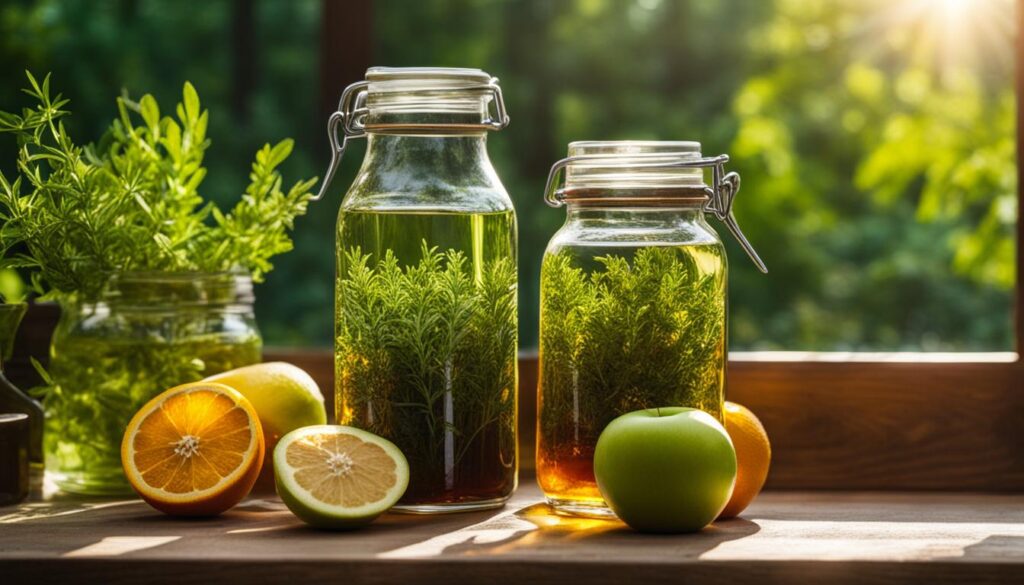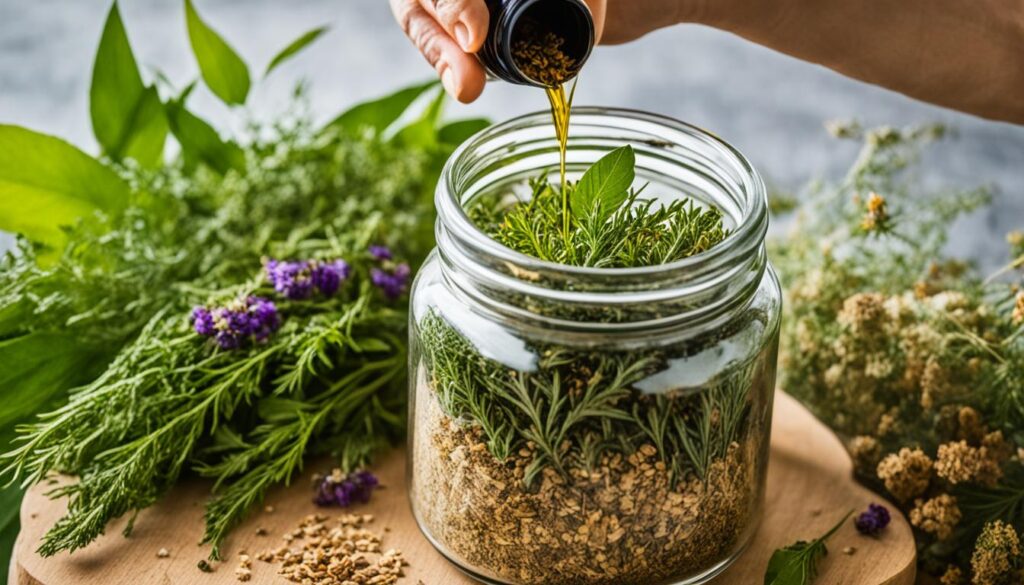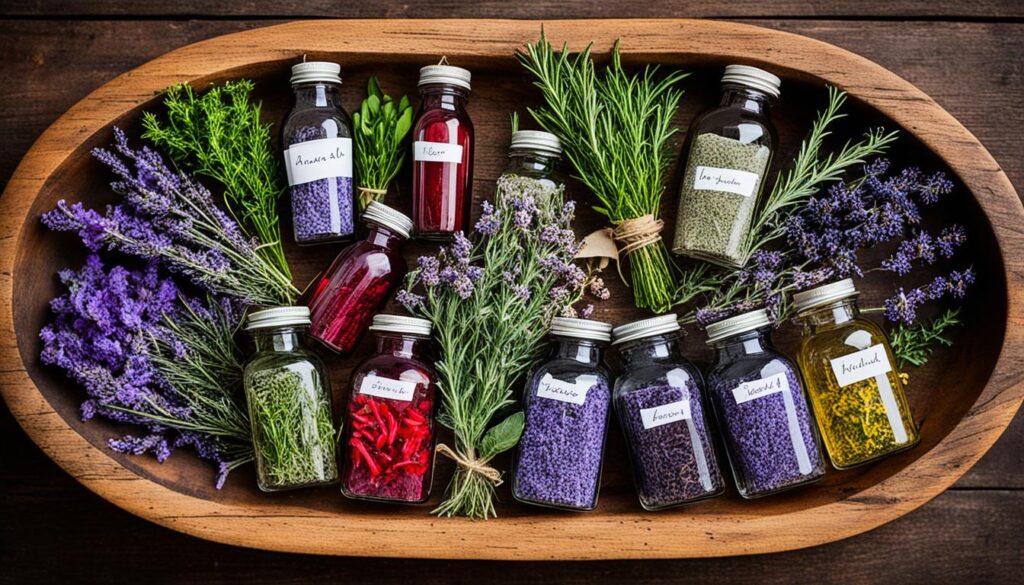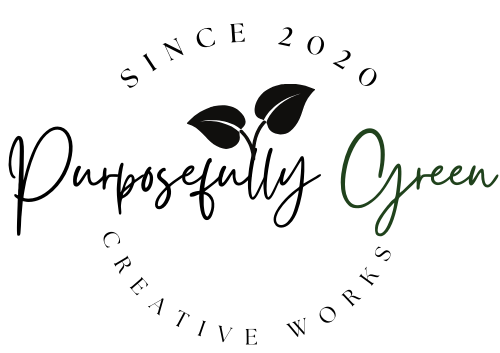Making your own herbal hair rinses can be a great way to rejuvenate your locks with the power of herbs. Whether you have issues with hair growth, dandruff, itchy scalp, or simply want to add shine and softness to your hair, herbal hair rinses can provide a natural and inexpensive solution. There are various herbs and ingredients you can choose from to customize your hair rinse based on your specific needs and hair type. Chamomile, rosemary, sage, nettle, and black tea are among the popular herbs used in hair rinses. You can also add essential oils for added effectiveness or apple cider vinegar to balance the pH of your scalp and add shine to your hair.
Key Takeaways:
- Herbal hair rinses can address various hair concerns and provide a natural alternative to commercial hair care products.
- Customize your herbal hair rinse with herbs and ingredients that suit your hair type and specific needs.
- Popular herbs for hair rinses include chamomile, rosemary, sage, nettle, and black tea.
- Essential oils and apple cider vinegar can be added to enhance the effectiveness of your herbal hair rinse.
- Experiment with different recipes and enjoy the benefits of DIY herbal hair care.
The No Poo Method and its Challenges
The No Poo method has gained popularity among those seeking a more natural hair care routine. This method involves avoiding the use of commercial shampoos and conditioners, which can be laden with harsh chemicals. However, it is important to note that the No Poo method may not work for everyone.
Transitioning to the No Poo method can come with its challenges. Some individuals find that their hair needs time to adjust to the absence of conventional hair products. They may experience a period of greasiness or dryness as their scalp’s oil production regulates. Additionally, some people may not be satisfied with the results they achieve using the No Poo method.
If you are not ready to fully commit to the No Poo method, there are alternative options to consider. One compromise is to use sulfate-free shampoo and conditioner. These products are milder on the hair and scalp, avoiding the harsh chemicals found in conventional shampoo and conditioner. Sulfate-free options can offer a gentler approach to hair care while still maintaining cleanliness and moisture.
To enhance the benefits of a sulfate-free hair care routine, herbal hair rinses can be a great addition. DIY herbal rinses, made from natural ingredients, can provide additional benefits for the hair and scalp. These rinses can be customized based on individual hair types and concerns, allowing for a more personalized approach to hair care.
Benefits of Herbal Hair Rinses
Herbal hair rinses offer a range of benefits, including promoting hair growth, addressing dandruff and itchy scalps, improving circulation in the scalp, softening hair, removing residue from hair care products, and adding shine. By using herbs such as chamomile, rosemary, sage, nettle, and black tea in hair rinses, individuals can harness the power of nature to achieve healthier, more vibrant hair.
Pros and Cons of the No Poo Method and Sulfate-Free Products
| No Poo Method | Sulfate-Free Products |
|---|---|
| Eliminates exposure to harsh chemicals | Milder alternative to conventional products |
| Potential for healthier, more natural hair | Retains cleanliness and moisture |
| May require an adjustment period for the hair | Less likely to cause dryness or greasiness |
| Results may vary | Offers a gentler approach to hair care |
Image: DIY Shampoo and Conditioner
Understanding the Benefits of Herbal Hair Rinses
Herbal hair rinses offer a multitude of benefits for various hair types and concerns. Whether you’re looking to stimulate hair growth, combat dandruff and itchy scalps, improve circulation in the scalp, soften your hair, remove residue from hair care products, add shine, or enhance natural highlights, herbal hair rinses can be an effective solution. By carefully selecting the herbs and ingredients for your hair rinse, you can address specific issues and achieve the desired results.
Promote Hair Growth
To promote hair growth, herbs like rosemary, nettle, and burdock root are commonly used in herbal hair rinses. These herbs have properties that can stimulate the hair follicles, improve scalp health, and encourage healthy hair growth.
Relieve Dandruff and Itchy Scalps
If you’re dealing with dandruff or an itchy scalp, herbal hair rinses can help soothe and alleviate these concerns. Chamomile, calendula, comfrey leaves, rosemary, sage, and nettle are among the herbs that possess anti-inflammatory and antifungal properties, providing relief and promoting a healthier scalp.
Improve Circulation in the Scalp
Good blood circulation is essential for healthy hair growth. Certain herbs, such as rosemary and nettle, can improve blood flow in the scalp, ensuring that essential nutrients reach the hair follicles, promoting stronger and healthier hair.
Soften Hair and Remove Residue
Herbal hair rinses can also help soften your hair and remove residue left behind by hair care products. Herbs like chamomile, yarrow, and raspberry leaf have conditioning properties that can leave your hair feeling silky and smooth, while effectively removing build-up.
Add Shine and Highlights
Adding shine and enhancing natural highlights is another benefit of herbal hair rinses. Hibiscus, red clover, and chamomile are known for their ability to add shine and bring out the natural highlights in your hair, giving it a radiant and healthy appearance.
“Herbal hair rinses provide a natural and holistic approach to hair care, offering a range of benefits for various hair types and concerns.”
With the right combination of herbs and ingredients, herbal hair rinses can be a valuable addition to your hair care routine. By targeting specific issues and harnessing the power of nature, you can achieve healthier, stronger, and more beautiful hair.

Choosing the Right Herbs and Ingredients for Your Hair Type
The choice of herbs and ingredients in your hair rinse can greatly impact the health and appearance of your hair. Consider your hair color and specific concerns when selecting the right herbs and ingredients for your hair type.
Light Colored Hair
If you have light-colored hair, such as blonde or silver, certain herbs can enhance your natural hue and add shine. Chamomile, calendula, yarrow, and hibiscus are excellent choices for light-colored hair. Infusing these herbs in your hair rinse can help maintain the vibrancy and brightness of your locks.
Dark Colored Hair
For those with dark-colored hair, like brown or black, it’s important to choose herbs that complement your rich tones. Rosemary and sage are recommended for dark hair as they can help enhance your natural color and add depth and shine to your strands.
Red/Auburn Hair
If you have red or auburn hair, you can use herbs that intensify and enrich your fiery tones. Calendula, hibiscus, and red clover are known to enhance the vibrancy of red hair and provide a beautiful boost of color.
Additional Minerals and Nutrients
Regardless of hair color, incorporating herbs that provide additional minerals and nutrients can promote healthy hair growth and overall hair health. Nettle, rosemary, sage, burdock root, chamomile, and comfrey are excellent choices for nourishing and strengthening your hair.
Dry or Oily Hair
If you struggle with dry or oily hair, your herb selection can help address these specific concerns. A combination of burdock root, calendula, chamomile, nettle, and comfrey can help balance the scalp’s oil production and provide relief for dry, itchy scalp.
Dandruff/Itchy Scalp
To combat dandruff and soothe an itchy scalp, consider adding herbs known for their antimicrobial and calming properties to your hair rinse. Burdock root, calendula, chamomile, comfrey leaves, rosemary, sage, and nettle can help alleviate these concerns and promote a healthy scalp.
Hair Loss
If you’re experiencing hair loss, certain herbs can potentially stimulate hair growth and strengthen your strands. Nettle, rosemary, and sage are known for their potential benefits in reducing hair loss and promoting a healthier scalp.
By carefully selecting the herbs and ingredients that cater to your hair type and concerns, you can create a personalized hair rinse that nurtures and enhances the natural beauty of your hair.
The Role of Teas in Herbal Hair Rinses
Teas are a vital ingredient in herbal hair rinses, providing additional benefits and enhancing specific hair colors. Let’s explore the various teas commonly used in herbal hair care:
Black Tea
Black tea is well-known for its ability to restore shine and add dark highlights to the hair. Its natural tannins can help darken the hair and improve its luster.
Green Tea
Green tea is rich in antioxidants and has potential hair-strengthening properties. It can help stimulate hair growth and promote overall hair health.
Rooibos Tea
Rooibos tea is particularly beneficial for individuals with light brown and red/auburn hair. It imparts a natural color boost to these hair tones, enhancing their vibrancy.
Lemon Juice
Lemon juice is a natural ingredient that can lighten hair color. Adding lemon juice to your herbal hair rinse can help create beautiful, sun-kissed highlights.
Baking Soda
Baking soda is effective at removing product buildup from the hair and scalp. It helps restore the hair’s natural pH balance and leaves it feeling clean and refreshed.
Black Walnut Hulls
Black walnut hulls are commonly used in hair rinses for dark hair. They can enhance the depth of color and add richness to dark hair tones.
By incorporating these teas into your herbal hair rinses, you can harness their unique properties and enjoy the added benefits they provide.
Essential Oils and Apple Cider Vinegar in Hair Rinses
When it comes to herbal hair rinses, essential oils and apple cider vinegar can play a vital role in enhancing their effectiveness and providing additional benefits. While some individuals prefer a completely herbal hair rinse, the addition of essential oils can offer unique advantages. Lavender, peppermint, and rosemary essential oils are popular choices for their aromatic properties and potential benefits for the hair and scalp.
Essential oils have long been used in natural remedies for their soothing, cleansing, and nourishing properties. Lavender essential oil, for example, can promote relaxation and help alleviate stress, which can indirectly benefit the health of your hair. Peppermint essential oil has a cooling sensation and can provide a refreshing experience when used in a hair rinse. Rosemary essential oil, on the other hand, is believed to stimulate hair growth and improve scalp circulation.
The Benefits of Essential Oils in Hair Rinses
Essential oils in hair rinses can enhance the overall hair care experience by providing aromatherapy benefits and potential hair and scalp improvements. They can add a pleasant scent to your hair, promote relaxation, stimulate hair growth, improve scalp health, and contribute to an overall rejuvenating experience.
However, it’s important to note that essential oils should be used in moderation, as their potency can cause skin irritation or sensitivity in some individuals. Diluting essential oils in a carrier oil or adding a few drops to your hair rinse mixture is recommended to ensure safe use.
Another popular ingredient in hair rinses is apple cider vinegar. This versatile and natural substance offers a range of benefits for the hair and scalp. Apple cider vinegar helps balance the pH level of the scalp, which can be particularly beneficial for those with dandruff or an itchy scalp. It also works as a natural conditioner, leaving hair feeling soft and smooth. Additionally, apple cider vinegar can remove product buildup and add shine to the hair, making it a valuable ingredient in a hair rinse.

The Many Uses of Apple Cider Vinegar
Apple cider vinegar is a versatile ingredient that can help balance the pH of the scalp, condition the hair, remove product buildup, and add shine. Its natural properties make it an excellent addition to a DIY hair rinse.
When using apple cider vinegar in a hair rinse, it’s important to dilute it with water to prevent any potential damage or irritation. A common ratio is one part apple cider vinegar to four parts water, but you can adjust the concentration based on your hair’s needs.
Remember, essential oils and apple cider vinegar are potent ingredients, and everyone’s hair and scalp are unique. It’s always wise to do a patch test before trying a new hair rinse to ensure your skin and hair are compatible with the chosen ingredients. If you notice any adverse reactions, discontinue use.
| Essential Oil | Potential Benefits |
|---|---|
| Lavender | Promotes relaxation, potential scalp improvement |
| Peppermint | Cooling sensation, refreshing experience |
| Rosemary | Stimulates hair growth, improves scalp circulation |
Table: Popular Essential Oils and Their Potential Benefits in Hair Rinses
In conclusion, the addition of essential oils and apple cider vinegar can elevate your DIY herbal hair rinse by providing additional benefits and enhancing its effectiveness. Essential oils offer aromatic and potential hair and scalp benefits, while apple cider vinegar helps balance the pH, condition the hair, and add shine. Remember to use these ingredients in moderation and always patch test before use to ensure compatibility. With proper use, essential oils and apple cider vinegar can be valuable assets in your natural hair care routine.
How to Make an Herbal Hair Rinse
There are two basic methods for making an herbal hair rinse – an herbal rinse and a vinegar rinse. Let me walk you through each method so you can choose the one that suits you best.
Herbal Rinse
-
Start by making a strong tea with your chosen herbs. You can use chamomile, rosemary, sage, nettle, or any other herbs that target your specific hair concerns.
-
Let the tea steep for at least 30 minutes to extract the beneficial properties.
-
Once cooled, strain the herbal tea to remove any solid particles.
-
Dilute the herbal tea with water to create a quart of liquid. The dilution ratio should be about 1 part tea to 3 parts water, but you can adjust it based on your preferences.
-
After shampooing your hair, slowly pour the herbal rinse through your hair, making sure to massage your scalp to stimulate blood circulation.
-
Allow the herbal rinse to sit in your hair without rinsing it out with water. This will allow the herbal properties to do their magic.
Vinegar Rinse
-
To make a vinegar rinse, start by infusing your chosen herbs in apple cider vinegar. You can use a combination of rosemary, sage, lavender, or any other herbs that suit your hair needs.
-
Let the herbs infuse in apple cider vinegar for several weeks to extract their beneficial properties.
-
After the infusion period, strain the mixture to remove the solid particles.
-
Dilute the infused vinegar with water. The ideal dilution ratio is 1 part vinegar to 3 parts water, but you can adjust it according to your preferences.
-
After shampooing your hair, pour the vinegar rinse over your hair, making sure to distribute it evenly.
-
For added shine, rinse your hair with warm water followed by a final blast of cold water.
Both herbal rinse and vinegar rinse can provide numerous benefits for your hair and scalp. Experiment with different herbs and ingredients to find the perfect combination that works for you.

DIY Herbal Hair Rinse Recipes
Looking to enhance your hair’s natural beauty? Try these DIY herbal hair rinse recipes tailored to your hair color and concerns.
Herbal Hair Rinse for Dark Hair
For those with dark hair, this rinse can help add shine and promote hair health:
| Ingredients | Benefits |
|---|---|
| Black walnut hulls | Enhances hair color |
| Sage | Strengthens hair |
| Rosemary | Stimulates hair growth |
| Raspberry leaf | Nourishes hair |
| Black tea | Restores shine |
Herbal Hair Rinse for Blond Hair
Want to enhance your blond locks? Try this gentle and nourishing rinse:
| Ingredients | Benefits |
|---|---|
| Chamomile | Lightens hair |
| Calendula | Adds shine |
| Yarrow | Revitalizes hair |
Herbal Hair Rinse for Red Hair
If you have red hair, this rinse can enhance your natural color and promote hair health:
| Ingredients | Benefits |
|---|---|
| Calendula | Enhances red tones |
| Hibiscus | Adds vibrancy |
| Red clover | Nourishes hair |
Herbal Hair Rinse for Dry, Brittle Hair
If your hair is dry or brittle, this conditioning rinse can help restore moisture:
| Ingredients | Benefits |
|---|---|
| Rosemary | Moisturizes hair |
| Nettle | Strengthens hair |
| Burdock root | Conditions hair |
| Comfrey root | Repairs damage |
| Baking soda | Removes buildup |
Herbal Hair Rinse for Oily Hair
If excess oil is a concern, this balancing rinse can help regulate scalp oil production:
| Ingredients | Benefits |
|---|---|
| Rosemary | Clarifies scalp |
| Nettle | Regulates oil production |
| Burdock root | Reduces oiliness |
| Comfrey root | Conditions hair |
| Baking soda | Removes excess oil |
Experiment with these recipes and customize them to suit your needs. Enjoy the benefits of DIY herbal hair care!

Extra Tips and Precautions for Herbal Hair Rinses
When using herbal hair rinses, you can experiment with different herbs and essential oil combinations to find the ones that work best for you. It’s important to note that herbal hair rinses don’t provide dramatic color changes but enhance natural highlights. You can also add other herbs like lavender flowers, sage, or peppermint leaves to your hair rinse.
Extra Tip: To enhance the effectiveness of your herbal hair rinse, consider using a preservative-free rinse. This helps avoid the potential adverse effects of artificial preservatives on your hair and scalp.
Since herbal hair rinses are preservative-free, they should be stored in the fridge and used within a week. This ensures that the rinse remains fresh and effective. To avoid the hassle of making a new rinse every week, you can make a large batch and freeze it in ice cube trays for future use.
Extra Tip: Freezing hair rinses can help prolong their shelf life and keep them readily available whenever you need them. Simply pop out a frozen cube, thaw it, and use as usual.
If using fresh herbs, double the quantity for infusion. This helps extract the maximum amount of herbal benefits into your hair rinse. Additionally, you can add a small amount of organic coconut or jojoba oil to your rinse for added conditioning.
Precautions:
While herbal hair rinses are generally safe and gentle, it’s always a good idea to perform a patch test before applying the rinse to your entire scalp and hair. This helps identify any potential allergic reactions or sensitivity. If you experience any adverse effects, discontinue use immediately.
Remember, herbal hair rinses are meant to be a natural and nourishing addition to your hair care routine. Enjoy the process of experimentation and customization, and embrace the benefits of DIY herbal hair care.
| Extra Tips for Herbal Hair Rinses | Precautions for Herbal Hair Rinses |
|---|---|
| – Experiment with different herbs and essential oil combinations – Add lavender flowers, sage, or peppermint leaves to hair rinse – Consider using a preservative-free rinse – Store in the fridge and use within a week – Freeze hair rinse in ice cube trays for extended shelf life – Double the quantity of fresh herbs for infusion – Add a small amount of organic coconut or jojoba oil for added conditioning |
– Perform a patch test before applying to the entire scalp – Discontinue use if any adverse effects occur |
Conclusion
Making your own herbal hair rinses can be a rewarding and natural way to care for your hair. By using herbs and natural ingredients, you can avoid the harsh chemicals found in commercial hair care products and customize your hair rinse to address your specific concerns. Whether you’re looking to promote hair growth, soothe an itchy scalp, add shine, or balance the scalp, herbal hair rinses can offer a gentle and effective solution. With the right combination of herbs and ingredients, you can achieve healthier and more beautiful hair. Experiment with different recipes and enjoy the benefits of DIY herbal hair care.
DIY Hair Care provides a great opportunity to take control of your hair and create personalized solutions that work for you. Natural Hair Care is gaining popularity due to its numerous benefits, and herbal hair rinses are a key aspect of this approach. By utilizing the power of nature, you can nourish your hair and scalp while avoiding synthetic additives that can be harmful in the long run.
Herbal Hair Rinses are versatile and can be tailored to various hair types and concerns. The extensive range of herbs and ingredients available allows you to customize your hair rinse according to your specific needs. Whether you have dry or oily hair, want to address dandruff or hair loss, or simply desire softer and shinier hair, there is a herbal hair rinse recipe for you.
Embracing Herbal Hair Treatments is not only beneficial for your hair but also for the environment. By reducing your consumption of conventional hair care products, you are contributing to a more sustainable lifestyle. Additionally, DIY hair care can be cost-effective, allowing you to save money while achieving hair that looks and feels amazing.
FAQ
What are the benefits of herbal hair rinses?
Herbal hair rinses can promote hair growth, alleviate dandruff and itchy scalp, improve circulation in the scalp, soften hair, remove residue from hair care products, add shine, and enhance natural highlights.
Which herbs and ingredients should I choose for my hair type?
For light-colored hair, chamomile, calendula, and yarrow are recommended. For dark-colored hair, rosemary and sage are suitable choices. Calendula, hibiscus, and red clover can enhance red/auburn hair. Nettle, rosemary, sage, burdock root, chamomile, and comfrey can provide additional minerals and nutrients for the hair. For dry or oily hair, a combination of burdock root, calendula, chamomile, nettle, and comfrey can help balance the scalp.
What are the benefits of teas in herbal hair rinses?
Black tea restores shine and adds dark highlights, green tea stimulates hair growth, and rooibos tea enhances light brown and red/auburn hair. Lemon juice can lighten hair color, while baking soda helps remove product buildup. Black walnut hulls are commonly used for dark hair.
Should I add essential oils or apple cider vinegar to my hair rinse?
Essential oils like lavender, peppermint, and rosemary can enhance the effectiveness of the hair rinse. Apple cider vinegar can balance the pH of the scalp, soften hair, and add shine. It can be used in combination with herbal ingredients to create a vinegar rinse.
How do I make an herbal hair rinse?
There are two methods – herbal rinse and vinegar rinse. For an herbal rinse, make a strong tea with your chosen herbs, strain, dilute with water, and pour through your hair after shampooing. For a vinegar rinse, infuse herbs in apple cider vinegar, strain, dilute with water, and pour over the hair after shampooing and rinsing.
Can you share some DIY herbal hair rinse recipes?
Certainly! For dark hair, try a rinse made with black walnut hulls, sage, rosemary, raspberry leaf, and black tea. For blond hair, a combination of chamomile, calendula, and yarrow works well. To enhance red hair, try calendula, hibiscus, and red clover. For dry or brittle hair, a rinse with rosemary, nettle, burdock root, comfrey root, and baking soda can provide conditioning. For oily hair, rosemary, nettle, burdock root, comfrey root, and baking soda can help balance the scalp.
Any extra tips and precautions for using herbal hair rinses?
Herbal hair rinses should be stored in the fridge and used within a week since they are preservative-free. To save time, you can make a large batch and freeze it in ice cube trays. It’s optional to add a small amount of organic coconut or jojoba oil for added conditioning.
Are herbal hair rinses suitable for all hair types?
Yes, herbal hair rinses can be customized for different hair types and concerns. However, it’s important to experiment with different herbs and oils to find the ones that work best for you.

